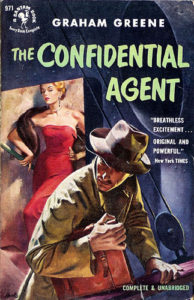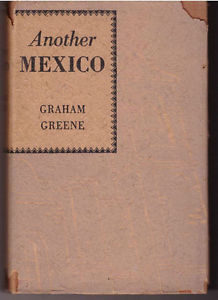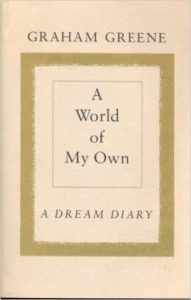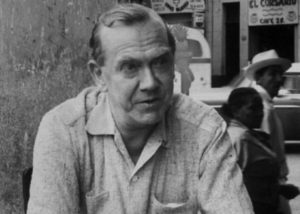Graham Greene And Mexico ~ A Hint Of An Explanation
In a short letter to the press, in which he referred to Mexico, Graham Greene substantially expressed his view of the world.
“I must thank Mr. Richard West for his understanding notice of The Quiet American. No critic before, that I can remember, has thus pinpointed my abhorrence of the American liberal conscience whose results I have seen at work in Mexico, Vietnam, Haiti and Chile.”
(Yours, etc., Letters to the Press. 1979)
Mexico is a peripheral country with a difficult history, and undeniably the very long border that it shares with the most powerful nation on earth has largely determined its fate.
After his trip to Mexico in 1938, Greene had very hard words to say about the latter country, but then he spoke with equal harshness about the “hell” he had left behind in his English birthplace, Berkhamsted. He “loathed” Mexico…” but there were times when it seemed as if there were worse places. Mexico “was idolatry and oppression, starvation and casual violence, but you lived under the shadow of religion – of God or the Devil.”
However, the United States was worse:
“It wasn’t evil, it wasn’t anything at all, it was just the drugstore and the Coca Cola, the hamburger, the sinless empty graceless chromium world.”
(Lawless Roads)
He also expressed abhorrence for what he saw on the German ship that took him back to Europe:
“Spanish violence, German Stupidity, Anglo-Saxon absurdity…the whole world is exhibited in a kind of crazy montage.”
(Ibidem)
As war approached, he wrote: “Violence came nearer – Mexico is a state of mind.” In “the grit of the London afternoon”, he said, “I wondered why I had disliked Mexico so much.” Indeed, upon asking himself why Mexico had seemed so bad and London so good, he responded: “I couldn’t remember”.
And we ourselves can repeat the same unanswered question. Why such virulent hatred of Mexico? We know that his money was devalued there, that he caught dysentery there, that the fallout from the libel suit that he had lost awaited him upon his return to England, and that he lost his reading glasses, among other things that could so exasperate a man that he would express his discontent in his writing, but I recall that it was one of Greene’s friends, dear Judith Adamson, who described one of his experiences in Mexico as unfair. Why?
 The answer might lie in the fact that he never mentioned all the purposes of his trip.
The answer might lie in the fact that he never mentioned all the purposes of his trip.
In The Confidential Agent, one of the three books that Greene wrote after returning to England, working on it at the same time as The Power and the Glory, he makes no mention whatsoever of Mexico, but it is hard to believe that the said work had nothing to do with such an important experience as his trip there.
D, the main character in The Confidential Agent, goes to England in pursuit of an important coal contract that will enable the government he represents to fight the fascist rebels in the Spanish Civil War, though Greene never explicitly states that the country in question is Spain. The said confidential agent knows that his bosses don’t trust him and have good reason not to do so, just as he has good reason to mistrust them.
We, who know Greene only to the extent that he wanted us to know him, are aware that writers recount their own lives as if they were those of other people, and describe the lives of others as if they were their own. Might he not, then, have transferred to a character called D, in a completely different setting, his own real experiences as a confidential agent in Mexico?
Besides wishing to witness the religious persecution in Mexico first-hand, his mission might also have been to report on developments in the aforesaid country and regarding its resources -above all its petroleum- in view of the imminent outbreak of the Second World War.
England possessed domestic coal supplies, but did not have enough petroleum reserves to sustain a war against worldwide fascism, which Greene deemed to be a nihilistic view of life that respected nobody and eschewed all rules, being destined to fight against it later as an employee of M16.
We may never know whether Greene worked as a confidential agent in Mexico, but there are some hints that this was indeed the case. Furthermore, in The Confidential Agent, he counterbalances the feelings expressed in his account of his travels in Mexico; in England, they call D a “bloody dago”, bearing witness to the fact that not only racism, but also violence, could also be found in the latter country where enemy agents roamed freely and the majority of businessmen were only out for personal profit.
Though D fails to get the contract he is after, he does fall in love with a girl and, in a last attempt to at least make sure that the enemy does not get its hands on the resources that he has failed to secure for his side, travels to Benditch, a coal-mining area beset by economic stagnation and unemployment, to ask the people there to show solidarity with his beleaguered people.
The book contains one scene in Benditch that makes it clear that England was not endowed with its own petroleum resources:
“…an odd metallic object rose over the crest.
He said, ‘What´s that?’
‘Oh, that’, the porter said, ‘that’s nothing. That was just a notion they got.’
‘An ugly-looking notion.’
‘Ugly? You’d say that, would you? I don’t know. You get used to things. I’d miss it if it weren’t there.
‘It looks like something to do with oil.’
‘That’s what it is. They had a fool notion they’d find oil here. We could have told ’em – but they were Londoners. They thought they knew.’
‘There was no oil?’
‘Oh, they got enough to light these lamps with, I daresay.’ ”
(The Confidential Agent.)
While D does not find the support he is looking for in Benditch, he succeeds in eliciting a response from some young anarchists who cause a big scandal by blowing up a coal mine, thus managing, at least, to prevent the other side from gaining access to the resources that it needs.
In one scene in The Power and the Glory, where the “whisky priest” can’t stop the half-breed from confessing his sins, the analogy between the latter character pouring out his sins and a gushing, out-of-control oil has a strong impact on us, because we are aware that petroleum has always played a central role in wars, and continues to do so to this day:
“…the man wouldn’t stop. The priest was reminded of an oil-gusher which some prospectors had once struck near Concepción – it wasn’t a good enough field apparently to justify further operations, but there it had stood for forty-eight hours against the sky, a black fountain spouting out of the marshy useless soil and flowing away to waste fifty thousand gallons an hour. It was like the religious sense in man, cracking suddenly upwards, a black pillar of fumes and impurity, running to waste. ‘Shall I tell you what’ve I done? –it’s your business to listen. I’ve taken money from women to do you know what…’ ”
(The Power and the Glory)
Ever since its colonization, Mexico has been the scene of disputes between the great powers, and, in 1938 the country was a centre for both overt and covert operations by the said powers, including, of course, Nazi Germany.
In The Lawless Roads, Greene mentions the presence in Mexico of two rebel fascist generals, Rodríguez in the north and Cedillo in San Luis Potosí. He managed to get an interview with the latter, just before his execution for armed rebellion, through the offices of “an old German teacher of languages” who was close to him and insisted on playing the philosopher: “Motion is life,” he said, “and life is motion,” as if referring to the perpetual motion spouting in the Nazi swastika.
Greene confessed to his readers, but not to the Mexican authorities, that the real purpose of his trip was to observe the religious conflict, and that he had only visited archaeological sites to mislead the authorities. Though the bloody religious war had ended by then, atrocities were still common; The Mexican Catholic hierarchy and General Cedillo belonged to the Mexican right wing, which maintained links with the Spanish Falangists and the German fascists.
In this context, while the Mexican Catholics were to be Greene’s fellows, those in Europe were to be his enemies, so that the distance between him and the European Catholic hierarchy was to be just as great as that between the imprisoned “whisky priest” and the bishop:
“He thought of the old man now – in the capital: living in one of those ugly comfortable pious houses, full of images and holy pictures, saying mass on Sundays at one of the cathedral altars.”
(Ibidem)
There were sympathizers with Germany not only in Mexico but also in many other parts of Latin America, and there were also stark contradictions in the United States, where, between 1938 and 1940, Nazi Germany was an important client of Rockefeller’s petroleum companies and of many other big corporations.
 There were German citizens who owned large coffee plantations, on which they hoarded large amounts of military supplies, in the Mexican state of Chiapas, where Greene discovered that people were awaiting the return of a conservative general called Pineda. A visit to the said state would enable him to take note of events that could affect his country when war broke out and in fact he travelled further into its interior than the “whisky priest” did, reaching the city of San Cristóbal de Las Casas, while the latter travels only a few miles inland, going back to the border between the states of Chiapas and Tabasco to die.
There were German citizens who owned large coffee plantations, on which they hoarded large amounts of military supplies, in the Mexican state of Chiapas, where Greene discovered that people were awaiting the return of a conservative general called Pineda. A visit to the said state would enable him to take note of events that could affect his country when war broke out and in fact he travelled further into its interior than the “whisky priest” did, reaching the city of San Cristóbal de Las Casas, while the latter travels only a few miles inland, going back to the border between the states of Chiapas and Tabasco to die.
German interest in Mexico, due to its geographical location and its resources, goes back as far as the First World War, on the eve of which British naval intelligence intercepted and deciphered what is known as the Zimmermann Telegram, which was a diplomatic proposal, made on January 16th, 1917, by Arthur Zimmermann, the Foreign Secretary of the German Empire, that Germany and Mexico form an alliance in the event that the United States entered World War I against Germany. The said telegram read: “We propose that Germany and Mexico form an alliance on the following basis: make war together, make peace together, generous financial support and an understanding on our part that Mexico is to regain its lost territory in Texas, New Mexico, and Arizona. Please draw the President’s attention to the fact that the ruthless deployment of our submarines now offers the prospect of compelling England to make peace within a few months.”
The aims set forth in the German proposal, which was merely meant as a provocation, were unachievable, and Mexico rejected it.
It seems unlikely that Greene could have been unaware of the aforesaid incident when he went to Mexico, since his uncle, Graham, had been Permanent Secretary of the Admiralty under Churchill during the First World War, in addition to which, while still very young, the author had written about the disastrous conditions imposed on defeated Germany under the Treaty of Versailles, opining that the British had been right to disassociate itself from the French thirst for revenge. “Otherwise,” he wrote, “another war is inevitable, and within twenty years.” (In the Occupied Area. Reflections)
Greene agreed with the comments made by the famous economist, John Maynard Keynes, about the armistice with Germany:
“But who can say how much is endurable, or in what direction men will seek at last to escape from their misfortunes?”
(The Economic Consequences of the Peace. 1919.)
While nothing now remains of it, what was to be referred to in retrospect as the Mexican Revolution did indeed occur and, for a time, bear fruit, thanks to the leadership of General Lázaro Cárdenas, who was Mexico’s president when Greene visited that country.
Cárdenas became president of Mexico in December, 1934, having taken his campaign the length and breadth of the country, calling on its people to join forces. Though his aim was to eventually restore Mexican sovereignty and recover his country’s petroleum resources from the foreign companies and governments that then controlled them, he first went about taking care of the people’s most pressing needs and making them more confident both in themselves and in their power as a social force. While he was by no means unflawed, nobody can accuse him of religious intolerance, given that it was he who sent the extremist, Garrido Canabal, into exile, along with ex president, Plutarco Elias Calles, who sympathized with Germany.
In 1935 the major task of organizing wage-earning workers was undertaken; company trade unions were transformed into large, industry-wide entities, including the one pertaining to the petroleum industry, while new organizations sprang up where none had previously existed. A wave of strikes and other industrial actions were favourably ruled on by the conciliation and arbitration boards and the courts, with the majority of wage and collective-bargaining disputes being won by the workers.
This major unionization effort was followed in 1936 by radical agrarian reform whereby almost 50 million acres of good arable land previously owned by landlords and foreign companies were split up into cooperatives called ejidos or divided into individual lots, in the wake of which came schools, rural teachers, universal primary education, and credits for the purchase of seed, harvesting and crop mechanisation, along with collective mooting of ejido projects and problems, and, in not a few cases, weapons to defend the aforesaid gains from the onslaughts of violent landlords and their private armies of paid hoodlums.
Under Cárdenas, Mexico supported the Spanish Republic with guns and money, subsequently granting asylum to exiled supporters of the Republican cause and opening its doors to the victims of political persecution. It denounced the invasion of Ethiopia by the Italian fascists and, on March 18th, 1938, when the petroleum industry was expropriated from the foreign interests that controlled it, it refused to recognize the annexation of Austria by the German fascists.
Notwithstanding the hardships that Mexico suffered as a result of the blockade imposed on it after the aforesaid expropriation, it supplied the allies with petroleum during the war, while Cárdenas’ personal support for the Cuban Revolution is common knowledge.
Greene must have realized that the expropriation of Mexican petroleum from the British companies did not mean a gain for Germany, since Cárdenas was anti-fascist. In Mexico this placed him in a stalemate position similar to that in which his character, D, finds himself when he endeavours to procure English coal for his country.
At this time when Mexican petroleum is once more being handed over to the big global corporations, and Mexico is distancing itself from the rest of Latin America, we would do well to recall that Greene acknowledged Mexico to be the country where his faith became far more emotional than intellectual.
In 1990 he wrote about “the dangerous preference for the poor” of the Catholic Church in Latin America and about the things he had seen during his visit to Mexico:
“…as early as 1937, there was a hint in Mexico of what might become the future base communities. As a result of persecution, the church had been a good deal cleansed of Romanism – even drastically cleansed as I had seen in Tabasco where no church and no priest remained, and hardly less so in Chiapas where no priest was allowed to enter a church. The secret Masses held in private houses might be described as middle-class, but when on Sundays the Indians came down from the mountains and tried to celebrate the Mass, as far as they remembered it, without a priest, surely the base communities were already beginning…”
(Church and Politics in Latin America. Foreword. 1990)
 He also mentioned Latin America in the speech he gave in the Kremlin:
He also mentioned Latin America in the speech he gave in the Kremlin:
“…for over a hundred years there has been a certain suspicion, an enmity even, between the Roman Catholic Church and Communism. This is not true Marxism, for Marx condemned Henry VIII for closing monasteries. But this is a suspicion which has reminded. For the last fifteen years or so, I have been spending a great deal of time in Latin America, and there, I’m happy to say, the suspicion is dead and buried, except for a few individual Catholics, nearly as old as I am. It no longer exists. We are fighting -Roman Catholics are fighting together with the Communists, and working together with the Communists. We are fighting together against the Death Squads in El Salvador. We are fighting against the Contras in Nicaragua. We are fighting together against General Pinochet in Chile.”
Saying “There is no longer a barrier between Roman Catholics and Communism” (Meeting in the Kremlin. 1987), Greene expressed a desire that the unity achieved in Latin America might spread all over the world.
Significantly, on one of the pages of his dream diary, A World of My Own, he writes: “In January 1983 I was in Mexico attached to a gang of guerrillas pursued by the army.”
But there can be no doubt the Latin American country with which Greene’s most closely identified as a human being was the Panama of Omar Torrijos. An excerpt from a report of his comments to Reuters press agency on December 20th, 1989, the day after the United States invaded Panama, reads:
“Greene said that General Manuel Noriega was not ‘half as bad’ as Washington’s record in Central America. Reached by telephone at his French Riviera home, the 85-year-old writer condemned yesterday’s intervention by US troops, asserting that ‘The United States has no business interfering in Panama’.”
Speaking thus shortly before his death, Greene remained faithful to his wish to die as a fighter…a Latin American fighter…a man with a faith. And a poet.
—
About the author:
Rubén Moheno was born in Guadalajara, Jalisco, México. He is an economist at the Universidad Nacional Autónoma de México, UNAM, where he also studied Law and Cinematography. He has made a feature film, and numerous documentaries, as director, screenwriter and cinematographer. He is a writer of short stories and essays on literature, film, economics, politics, international affairs, and translator of English and French literature into Spanish, with collaborations in various media, from 1990 to date. He is currently working in the Mexican newspaper La Jornada. He has lectured on Graham Greene and his work. He received the National Journalism Award 2000, awarded by the Journalists Club of Mexico AC, on 9 December 1999, for his essay ‘Graham Greene & The Lost Maps’.
Paper read at the Graham Greene International Festival in Berkhamsted, England (September 2014)




